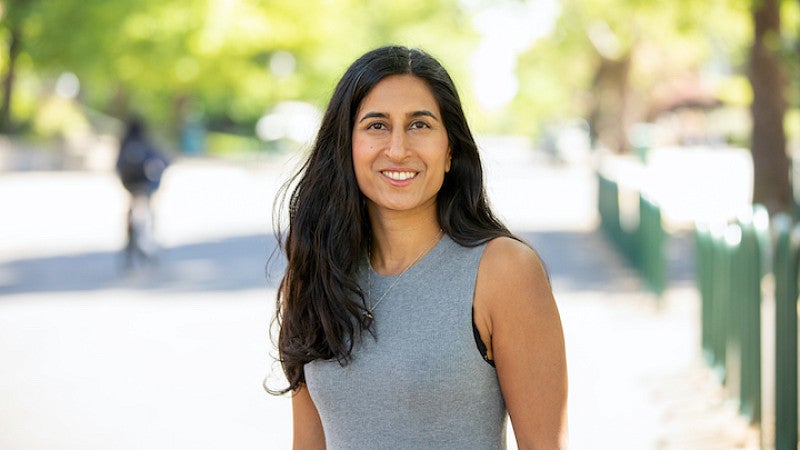
CHC Professor Anita Chari February 4, 2022 Story by Claire Warner, CHC CommunicationsPhoto by Maddie Knight, CHC Communications
At the security checkpoint, political science professor and Clark Honors College Faculty-in-Residence Anita Chari removed her shoes and her bag, stepped through a metal detector, and waited for the officer to give her the ‘green light.’ She wasn’t in an airport, but a prison—Oregon State Correctional Institution in Salem, Ore., and she was teaching a class through Inside Out.
Inside Out is a national program that allows campus-based students to take classes with incarcerated individuals behind prison walls. The University of Oregon has offered Inside Out classes in sociology, political science, geography and literature through Oregon State Penitentiary and the Oregon State Correctional Institution.
In Chari’s Inside Out course, “Autobiography as Political Agency,” students learn about the relationship between the personal and the political. Through reading autobiographies by Malcolm X, Assata Shakur, and Albie Sachs as well as writing their own stories, students study the concept of agency and consider the kind of impact they want to have on the world. While Chari hasn’t been able to teach the course inside since the start of the pandemic, she hopes to continue her work in prison education next year.
Chari explained that prison education “is really about creating a classroom space where you try to deal with the fact of hierarchy and great inequality, great privilege differences, great divides in life experience.”
While teaching “Autobiography as Political Agency” at OSCI, Chari came to appreciate CHC’s small class sizes, as she believed the intimacy of the honors college allowed her incarcerated and non-incarcerated students to develop trusting relationships which fostered deep conversations.
“There were profound experiences of people getting to resolve things that had come from their histories of racialized trauma or had come from being marginalized or experiencing violence from the prison system,” Chari said.
She believes that in order for these resolutions to occur, students must feel safe enough to express themselves.
“I think the question is how do you promote that kind of safety,” Chari said. “It’s actually a really challenging thing right now when we have so much political polarization in our classrooms. Our society is racked with conversations that are violent, really, when they should be about the collective good.”
Chari attempts to foster a safe classroom environment through embodied practices which encourage self-awareness, mindfulness, and self-acceptance. There are many examples of embodied practices, some of which include negotiating boundaries, reading to one another, and grounding practices “where you just get time to sit and feel the lower parts of your body, to feel your sit bones in contact with the ground, and to allow your nervous system to just slow down,” Chari said.
She first became interested in embodiment while pursuing her Ph.D. at the University of Chicago, where she felt excluded as a person of color in academia.
“I really think that if you want to help create an inclusive space, you have to include yourself,” Chari said. “We talk a lot about inclusion, diversity, and all that stuff in academia but in reality, until we learn how to include those parts of ourselves, we’re not going to be able to make the space feel safe for those who are marginalized.”
Chari has since used embodied practices to aid in her own as well as her students’ success, finding that through various exercises, her students have become “more settled in their bodies,” have reduced anxiety, and have gained a better understanding of what they want to study. She took care to explain, however, that it’s not all utopian.
“When you do these kinds of practices, you also can notice what’s real and what’s present comes forward,” Chari said. “I don’t believe that the purpose of the classroom is only to connect. I think it’s also to work through the deepest conversations that we have in society which are potentially generative of conflict, and hopefully, that conflict is respectful and healthy.”
The Inside Out program has not been possible due to the pandemic. Until she can return to teaching in Inside Out, Chari will continue promoting respectful and healthy discussion in her CHC course spring term titled “Music and Politics.” Chari explained that in pop songs, lyrics about sex and partying are often presented as universal and therefore apolitical. Chari will encourage her students to interrogate this image.
Students will ask questions like, What gets excluded from that picture? What is political about the way music moves us? With questions like those, Chari wants students to also consider how African American music traditions have been simultaneously included and excluded from popular traditions.
“You have at one and the same time the music of African American people taken up to become the general sound of American music and at the same time, in a way, taken away and without really sufficient recognition that that is actually what’s happening,” Chari said.
She encourages CHC students who take her classes to “be prepared to try something new. I think that’s what I’m really interested in doing while I’m at the honors college, is having a sense of experimentation in our work together.”
